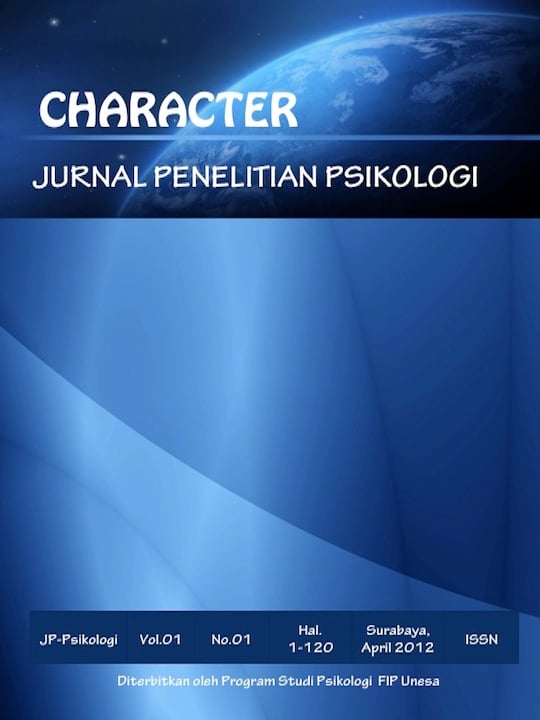MANAJEMEN KONFLIK PERNIKAHAN PADA PEREMPUAN YANG MENIKAH DI USIA MUDA
DOI:
https://doi.org/10.26740/cjpp.v9i6.47026Abstract
Abstrak
Kematangan emosi pada pasangan yang menikah muda dapat memicu timbulnya konflik dan berpotensi menimbulkan perceraian. Dibutuhkan manajemen konflik yang baik untuk menghadapi konflik yang timbul untuk mencegah perceraian. Fokus penelitian ini adalah untuk mengetahui penyebab konflik, bentuk manajemen konflik, serta faktor yang mendorong penerapan manajemen konflik pernikahan pada perempuan yang menikah di usia muda. Penelitian ini menggunakan metode kualitatif dengan pendekatan studi kasus. Partisipan terdiri dari tiga orang yang memutuskan menikah di usia muda. Adapun karakteristik dari ketiga partisipan tersebut antara lain adalah perempuan yang usia pernikahannya 1-5 tahun, perempuan yang menikah di usia 19-21 tahun, dan perempuan yang menikah pada saat sedang menempuh pendidikan. Teknik pengumpulan data dilakukan dengan proses wawancara semi terstruktur yang mengacu pada pedoman wawancara yang telah disusun sebelumnya. Data akan dianalisis menggunakan teknik tematik dan diuji kredibilitasnya menggunakan teknik triangulasi dan member check. Hasil penelitian menunjukan terdapat tiga tema utama yaitu penyebab konflik, bentuk manajemen konflik, serta faktor yang mempengaruhi penerapan manajemen konflik oleh perempuan yang menikah di usia muda. Adapun penyebab konflik antara lain adalah permasalahan pendidikan dan kematangan emosi, hal ini berakibat pada tidak mendapatkannya restu dari orang tua, stres, dan konflik dengan pasangan. Lebih lanjut lagi, bentuk manajemen konflik yang terbukti efektif untuk diterapkan pada konflik tersebut adalah akomodasi, kolaborasi, dan menghindari konflik. Terakhir, faktor yang mempengaruhi kemampuan penerapan manajemen konflik yaitu introspeksi diri, menjalin komunikasi yang baik, sikap menghargai, dan dukungan dari pasangan.
Kata Kunci: manajemen konflik, menikah muda, dan perempuan
Abstract
Emotional maturity in couples who marry young can trigger conflict and potentially lead to divorce. It takes good conflict management to deal with conflicts that arise to prevent divorce. The focus of this study is to determine the causes of conflict, forms of conflict management, and factors that encourage the application of marital conflict management to women who marry at a young age. This study uses a qualitative method with a case study approach. Subjects consisted of three people who decided to get married at a young age. The characteristics of the three subjects include women whose marriage age is 1-5 years, women who marry at the age of 19-21 years, and women who marry while studying. The data collection technique was carried out with a semi-structured interview process that referred to the interview guidelines that had been prepared previously. The data will be analyzed using thematic techniques and tested for credibility using triangulation techniques and member checks. The results showed that there were three main themes, namely the causes of conflict, forms of conflict management, and factors that influence the application of conflict management by women who marry at a young age. The causes of conflict include educational problems and emotional maturity, this results in not getting approval from parents, stress, and conflict with a partner. Furthermore, the forms of conflict management that have proven effective to be applied to the conflict are accommodation, collaboration, and conflict avoidance. Finally, the factors that affect the ability to implement conflict management is self-introspection, establishing good communication, respect, and support from husband.
Keywords: conflict management, young marriage, and women
Downloads
Downloads
Published
How to Cite
Issue
Section
License
Authors who publish in this journal agree to the following terms:
Copyright in any article is held by the author.
The author grants the journal, publication rights with the work simultaneously licensed under a Creative Commons Attribution License that allows others to share the work with an acknowledgment of the work's authorship and initial publication in this journal.
Authors may enter into separate, additional contractual arrangements for the non-exclusive distribution of the journal's published version of the work (e.g., posting it to an institutional repository or publishing it in a book), with an acknowledgment of its initial publication in this journal.
Authors are permitted and encouraged to post their work online (e.g., in an institutional repository or on their website) prior to and during the submission process, as this can lead to productive exchanges, as well as earlier and greater citation of published work.
 Abstract views: 1171
,
Abstract views: 1171
, PDF Downloads: 1835
PDF Downloads: 1835





